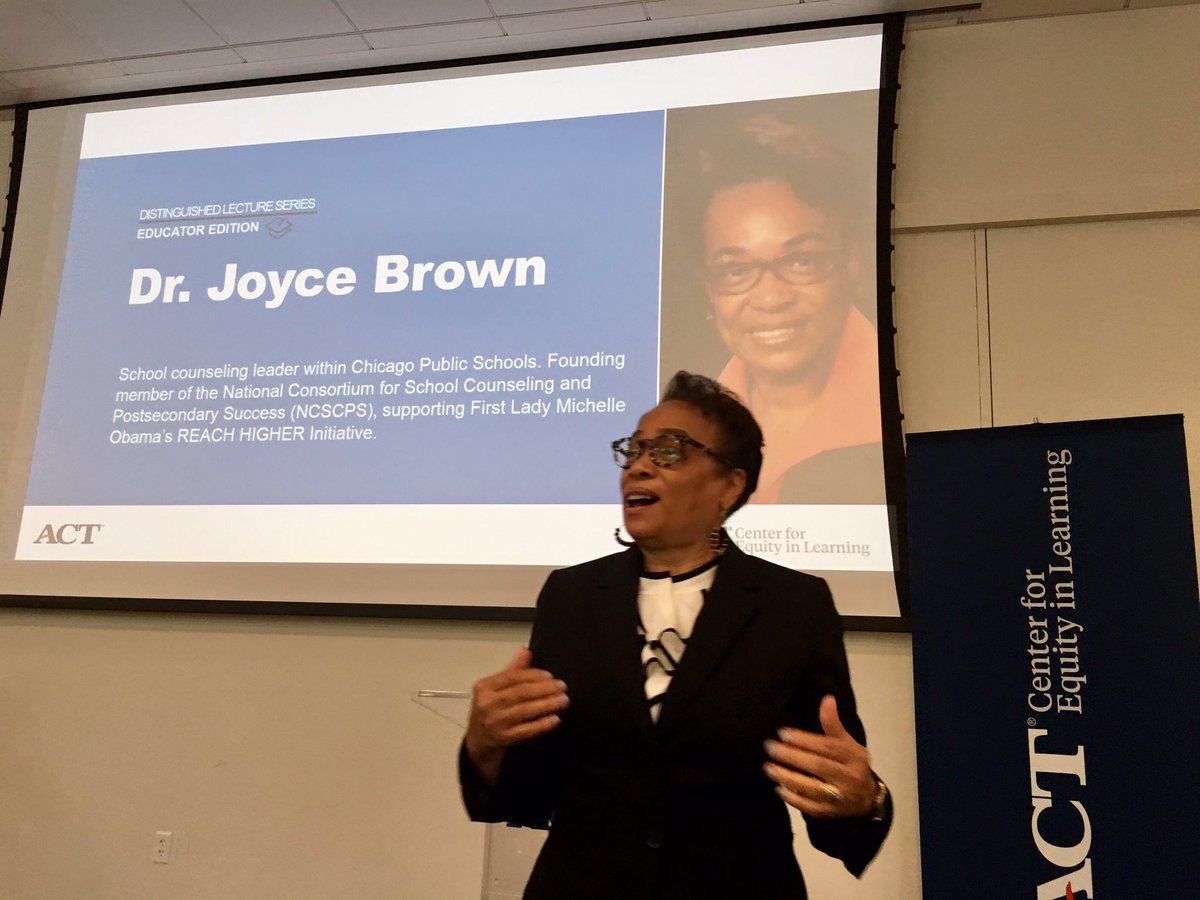
Last week, ACT hosted our Distinguished Lecture Series, inviting exceptional educators who are reaching underserved students in extraordinary ways to our Iowa City campus. Joyce Brown was one of our guest speakers. Read on and be inspired.
What inspires you about your work in education?
I am inspired by the voices of countless former students who speak these simple words to me, “Thank you for helping me get to college.” Their voices confirm the life altering value of education and motivate me to continue advocating for the engagement of school counselors as leaders of college and career readiness, at the frontline of educational institutions—–schools. I am even more inspired by the selfless work of school counselors, especially in districts with high underrepresented populations, who diligently work to create equitable postsecondary outcomes for all students, while fighting for adequate training and resources.
Recent Civil Rights data, informs us that school counseling does not look the same across America. In well-resourced districts, school counselors serve as an integral part of college and career readiness practices, while in many under-resourced schools, school counselors are often absent or tasked with “other duties as assigned.”
Former First Lady Michelle Obama’s Reach Higher initiative focuses on strengthening school counseling and college advising and shines a prominent light on supporting the school counseling profession. I am inspired by the engagement of 43 state teams working across six national White House School Counseling Convenings, supporting the elevation of school counselors into a college and career readiness leadership role to help all students reach for an education beyond high school.
What is the most important thing a person who isn’t from the same environment as your students should know about them?
External partners must enter the work in my large urban district armed with a mindset of resolve and commitment that positions them as postsecondary dream makers, who possess the experience and cultural competence to immediately engage students in postsecondary pathways. External partners must demonstrate a 24/7 commitment to changing the trajectory of students who, each day, enter school facing untold barriers, while maintaining a leadership vision that anticipates student needs and implements effective interventions. Focusing on these actions will enable “outsiders,” who often lack similar personal experiences as my students, to problem-solve obstacles that often impede post-secondary persistence.
Cultural competence begins with a relationship based on understanding student aspirations. Connections must be “real and relevant” and convey an understanding that students have college knowledge deficits, not deficits of aspirations. When I work with students, I see myself and BELIEVE they can become more than their current circumstances. All students have hopes and dreams, know what they want to accomplish, but often lack the resources, guidance, and information to achieve their goals. Students from my community are both resilient and persistent, but even more importantly, they are girded in grit. External partners must bring a heart of care to this very important work. Care works wonders. Look at me!
Chicago often gets a bad rap, but there are lots of amazing things going on in Chicago Public Schools. Tell us what you’re most excited about in CPS?
I am excited that the vision of Chicago Public Schools counselors serving as college and career readiness equity leaders has been institutionalized across a large urban district, with continuous training and the implementation of intentional systems of postsecondary practices and supports.
For over 10 years, Chicago Public Schools has experienced a steady increase in college-going rates and has outperformed other large districts, where most first-generation, low-income students reside. In 2004, a Department of Postsecondary Education was established under former Superintendent Arne Duncan to support a vision of “College Is Possible” for every student. As District Director of School Counseling, in the newly-formed department, I implemented a robust training agenda for school counselors, to position them as college counselors. School counselors participated in monthly training sessions that focused daily practices on use of data to track key postsecondary performance indicators, including FAFSA tracking. These counselor college advising trainings supported the continuous improvement of district college-going rates. The Chicago Counseling Model has been adapted by school districts across the nation and has been expanded within CPS, and now exists within and Office of School Counseling and College Advising.
What’s the biggest change you’ve seen over the course of your career in education, and what’s the biggest thing we still need to change?
The expectation that students obtain some postsecondary education either through a two- year college, four-year college, industry credential, or military training is the biggest educational change that I have witnessed. I grew up in a time where the expectation was high school graduation and students went to work after high school. Today, jobs of the future require higher training levels and this creates the necessity for all students to obtain postsecondary credentials.
In order to address postsecondary expectations, adequate resources must be provided to support the implementation of a vision of high school graduation and postsecondary persistence for all students. This is the biggest change that needs to take place. Data informs us where critical areas of need exist, but there is a lack of funding, training, and resources to impact and create equitable outcomes for students residing within the most “at need” communities.
Dr. Joyce Brown is a recognized school counseling leader, serving as a teacher, counselor and district director of School Counseling, within Chicago Public Schools. She has designed and implemented numerous programs focused on student achievement resulting in college and career readiness, high school transition practices and counselor leadership, for first generation, low income student populations.
